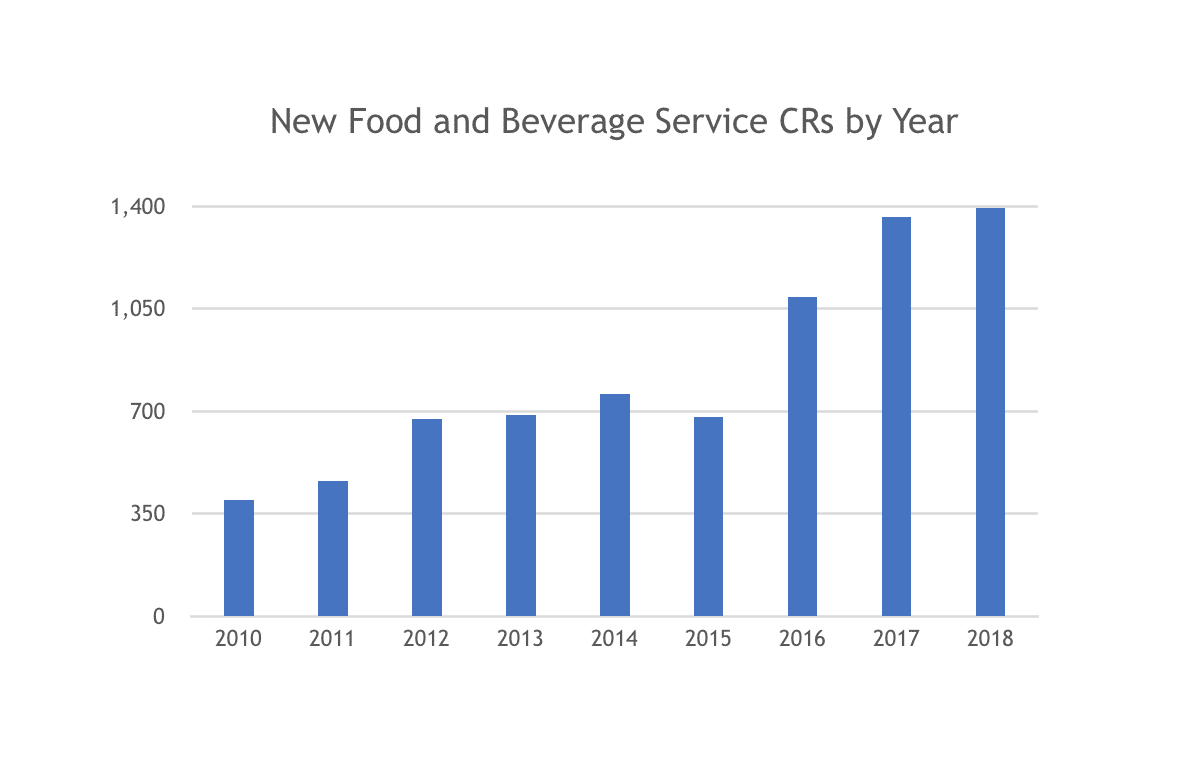Over the past decade, Bahrain has been growing its private sector, with initiatives to encourage new startups and businesses. One of the most visible outcomes has been the explosive growth in the number of restaurants and cafés in the country; in 2010, there were about 400 new commercial registrations (CR) in the Food & Beverage (F&B) services sector. In 2018, the number of new entrants was closer to 1,400.
What has been interesting about the F&B sector is how it has evolved and developed: we’ve seen trends come and go, from cupcakes and Instagram bakeries to local Bahraini breakfast cafes, home delivery meal plans and food trucks. The most current trend seems to be for burger places and artisanal coffee shops. One question I’ve recently been thinking about is: what causes these trends?

Source: www.sijilat.bh/
Although this isn’t an exhaustive list, I think there are at least three factors that can explain these market dynamics:
- This is a natural process: Bahrain is still a young market. Whenever a first-mover sets up a successful venture, that signals a possible trend. Since the barriers to entry in the F&B sector are low, other businesses can quickly start entering the market to capitalise on this demand. This goes on until the competition drives profits down to where only the most successful can stay in businesses (or the trend changes). For customers, this is a great thing – you get all this choice on where to eat, although this means that a lot of places eventually fail. Boom and bust.
- Imitation is easier than innovation: Creating a new, untested product is hard. You have to conduct market research, undertake feasibility studies, take risks etc. If an entrepreneur can already see the demand at other similar businesses, half the work is already done. The F&B sector is also generally high-margin, which can be appealing to someone looking to start a business (how much does a cup of coffee even cost to make?).
- Illusory Superiority: In a study done in the 1980’s, a number of Americans were asked to rank their driving skills: over 90% said that they were better than average. This obviously can’t be true. This cognitive bias, where people tend to overestimate their own abilities relative to others, is known as illusory superiority. I suspect that this bias finds its way here too. I’m sure most entrepreneurs are aware that the start-up failure rate is very high, but probably think that their own risk of failure is much lower.
I’m sure there are plenty of other reasons, but those are three ones to keep in mind. This also doesn’t address why specific things suddenly become popular, which might actually be a more interesting (but difficult) question. The reasons could be due to a whole host of cultural, social and economic factors, ranging from adopting broader international trends (e.g. the current shift towards more sustainable lifestyles) to status signalling and class dynamics. One last thing to consider is that we collectively are the drivers of these trends, so we should keep that in mind whenever we decide to jump on the next bandwagon.

